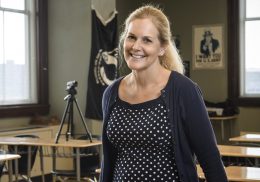Excerpt

Bridget Federspiel works with both high school students and Wright State student veterans to interview U.S. veterans for the Library of Congress.
Tucked away in an unassuming gray filing cabinet in Bridget Federspiel’s history classroom at Stivers School for the Arts are the wartime memories of more than 550 U.S. military veterans.
Federspiel and her students have spent more than 12 years conducting videotaped interviews of veterans who served in conflicts from World War II to Afghanistan. The interviews have been sent to the Library of Congress as part of its Veterans History Project, but Federspiel also keeps copies at the Dayton public school where she teaches.
“Sometimes I sit back and think I am so fortunate, so lucky. I get a chance to listen to these stories,” said Federspiel, who earned her master’s degree in history from Wright State and also teaches history at the university. “I tell the students if a veteran opens up to you, it’s like this intimate conversation and you should be so honored that they are sharing this information.”
Army, Navy, Marine and Air Force veterans in full military uniform walk into Federspiel’s third-floor classroom to tell their stories. Her students have met Green Berets and even a recipient of the Medal of Honor, the highest award for valor in action.
The veterans bring photos, maps, scrapbooks, letters, medals, lapel pins and other trappings of their experiences. One veteran gave Federspiel an 11-foot-long Nazi banner he confiscated from the side of a building in Berlin at the end of World War II.
The interviews often become emotional. Federspiel and three of her male students once interviewed a soldier at his home who had taken part in the D-Day landings in France during World War II.
“He gets to when he landed on the beach and I could see him getting quiet,” Federspiel recalled. “All of a sudden he burst into tears and he’s just sobbing. The boys immediately turn off the camera and go over and comfort this man.”
She said it was a powerful lesson in how history is much more than just dates and places.
“You saw a man break down and cry 65 years after he landed on that beach. That’s how much it affected him,” she said. “That’s what I want my students to remember. That’s going to have a bigger impact on them than anything else.”
Federspiel intends to conduct similar interviews when she goes to Vietnam in January as part of a Fulbright Distinguished Teaching Award. She believes she will spend the four months at the University of Hanoi, where she will take and teach classes.
“My choice was Vietnam because of the oral history — to go over to talk to the Vietnamese about the war, to bring questions from the U.S. veterans that I interview here back to Vietnam,” she said.
In 2001, Federspiel won a James Madison Fellowship, enabling her to get her master’s degree in history from Wright State. As a graduate student, she was encouraged to participate in the Library of Congress Veterans History Project by Marjorie McLellan, associate professor of urban affairs. The project collects and preserves firsthand remembrances of U.S. wartime veterans to ensure that future generations better understand the realities of war.
Federspiel’s first interview was with a Xenia man who had served in three wars.
“The whole time I was sitting there interviewing him I was thinking: ‘This is what my high school students need to do. This would be great for my students to sit here and listen to our veterans talk about their service.’”
So in 2005, Federspiel and her students started their own veterans history project.
“I bought a videocamera from the pawn shop downtown, and we had a tape recorder,” she said. “We collected 50 interviews the first year.”
Federspiel finds many of the veterans through word of mouth, with one veteran referring her to another veteran and so forth. She also has made connections with chapters of the Veterans of Foreign Wars.
The interviews can be a lot of work. When they are conducted at the homes of the veterans, Federspiel must transport her student interviewers because they are too young to drive. Each interview must be 30 minutes long. There is paperwork to do, photos to be taken and the interviews burned to CDs and DVDs.
So far, Federspiel and her students have collected 555 interviews and sent them to the Library of Congress. Since she began the project, Federspiel has twice traveled to the Library of Congress to check up on her hundreds of interview contributions.
“It’s pretty cool,” she said. “They know my name. They say, ‘Oh, you’re the lady who sends everything in with the kids.’ It’s neat to be recognized.”
As an adjunct faculty member in Wright State’s Department of History, Federspiel began teaching a Veterans Voices class with the university Veterans Military Center after being contacted by Seth Gordon, director of the center. She teaches Wright State student veterans how to take the oral histories of other veterans. So far, the college veterans have interviewed about 100 veterans on their own, many of which have aired on WYSO Public Radio.
View the original post at xeniadailygazette.com

 Wright State business professor, alumnus honored by regional technology organizations
Wright State business professor, alumnus honored by regional technology organizations  Wright State University Foundation awards 11 Students First Fund projects
Wright State University Foundation awards 11 Students First Fund projects  Gov. DeWine reappoints Board Treasurer Beth Ferris and names student Ella Vaught to Wright State Board of Trustees
Gov. DeWine reappoints Board Treasurer Beth Ferris and names student Ella Vaught to Wright State Board of Trustees  Joe Gruenberg’s 40-Year support for Wright State celebrated with Honorary Alumnus Award
Joe Gruenberg’s 40-Year support for Wright State celebrated with Honorary Alumnus Award  Wright State’s elementary education program earns A+ rating for math teacher training
Wright State’s elementary education program earns A+ rating for math teacher training 